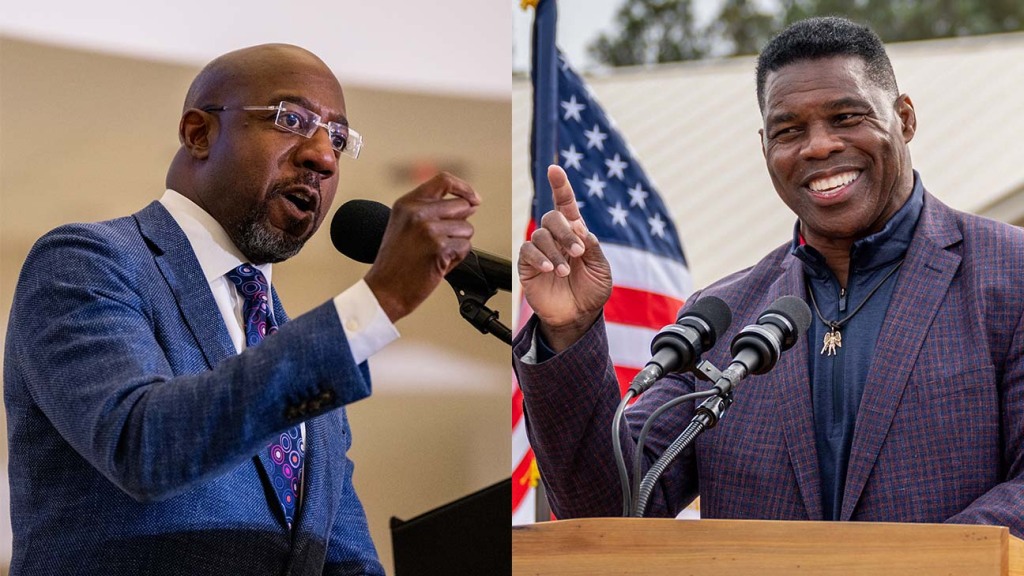
One of the most important dates on this year’s political calendar may just be Nov. 26.
The Saturday after Thanksgiving will bring with it a 128-year-old rivalry, a football game between the University of Georgia Bulldogs, and the Georgia Tech Yellowjackets (or, as the rivalry is referred to locally, “Clean Old-Fashioned Hate”).
The football game will air nationally on ESPN, and viewers outside of Georgia may get a taste of what residents of the state have been seeing on their TVs in recent months.
On Dec. 6, just a week and a half after the game, Georgia will host a runoff election for a U.S. Senate seat, with incumbent Raphael Warnock and challenger Herschel Walker (who played for the Georgia Bulldogs from 1980-1982) facing off.
An ESPN source says that “there is significant interest from both candidates in the Georgia run-off election, as well as [from] the PACs,” in the football rivalry game, as well as other upcoming ESPN games (like the Georgia Tech at Iowa basketball game Nov. 29).
Indeed, viewers of any college sporting event featuring a team from Georgia (or neighboring states, for that matter) are all but assured to have seen ads from Warnock, Walker, or the various Super PACs funneling cash into the race.
According to Medium Buying, which tracks political ad spending and rates, 30 second spots during the Georgia-LSU SEC championship game Dec. 3 on Atlanta’s CBS affiliate (owned by Gray TV) are running for $130,000; 30 second ads on Fox’s Atlanta station for Monday’s U.S.-Wales match in the World Cup are running for $35,000. And those are candidate discount rates, with PACs facing a much steeper market rate.
Medium Buying notes that as of Nov. 17, more than $31 million in TV ads had been booked, and that number is expected to accelerate in the coming days as the campaign war chests are restocked and the PACs home in on where they want to funnel cash.
The Senate runoff is shaping up to be yet another bonus bonanza for the TV business, and it comes amid a difficult economic environment, with non-political ads beginning to crater.
That means any TV company with exposure to the state of Georgia could benefit, though there are a number of reasons why the advertising haul won’t be as lucrative this year as it was for a similar runoff in Jan. 2021.
For starters, the Jan. 2021 special elections were for two Senate seats (they were eventually won by Warnock and Sen. Jon Ossoff), and control of the U.S. Senate. This time around, only one seat is up for grabs, and Democrats have already locked in Senate control (though a 51st Senator would make their lives that much easier).
In addition, the state of Georgia changed its election rules after the 2021 runoffs, shortening the window for the special election to 4 weeks, instead of the 2 months in 2020 and 2021.
According to AdImpact, more than $500 million was spent for the 2020 runoffs.
While it isn’t yet clear how much will be spent this time around, one political ad watcher predicts it will be closer to $150 million-$200 million this time around.
Why?
The shorter window (which means less time for campaigns to raise money), and the single election, should mean less spend, though as a source in the political advertising world noted: Super PACs could change the equation, with their deep pools of cash, and willingness to pay market rates.
But that tightened window also means less time for deals to get made, or for networks to move inventory around.
As a result, ESPN’s rivalry game won’t have quite as many politics ads as one might expect. “Our live sports inventory is very tight so we are limited in terms of what we can accommodate,” the ESPN source adds.
Other beneficiaries of the advertising bonanza will look mighty similar to those from 2020: Fox Corp., which owns a station in Atlanta as well as Fox News, should see a steady inflow of advertising (especially with the NFL, college football and the World Cup). Nexstar, TEGNA, and Gray Television all own multiple stations in the state, as well as stations in neighboring states like Florida, South Carolina, and Alabama, some of which overlap with counties in Georgia.
It’s all shaping up to be an early holiday present for the companies involved, and perhaps a temporary reprieve from the advertising chill encompassing the rest of the media landscape.

